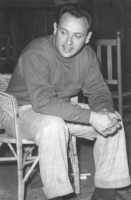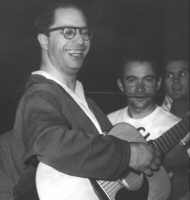 |
 |
 |
 |

Joe Glazer was born in New York City in 1918; his parents were Jewish immigrants from Poland. His father belonged to the International Ladies Garment Workers Union, but was never an activist. Glazer developed an early interest in music, and often sang in synagogues. Inspired by the singing cowboys he heard in Saturday matinees, he bought a six-dollar guitar from the Sears Roebuck catalog and took a few lessons through a Works Progress Administration program.While attending Brooklyn College during the mid-'30s, Glazer noted the differences between various political factions on campus. "We had very active groups and four or five radical groups," he recalled. "They had Trotskyites and they had splits from the Trotskyites, and Socialists and Communists... The Communists on campus were probably the strongest."
Glazer never became involved with any of these groups, but was friendly with the Democratic Socialists who followed Norman Thomas. "Norman Thomas used to say, 'No socialism without democracy, and no democracy without socialism,"' Glazer recalled. By comparison, he believed the Communists just followed the Moscow Party line blindly, no matter what. After graduating in 1938, Glazer decided to become a popular songwriter. "I did get one song published and I got S1.92" he admitted. "It was just a pop-type novelty song called 'Yogi, Yogi the Fakir Man.' A record was put out by a guy named Reggie Childs."
Looking to make contacts within the entertainment industry, Glazer attended a meeting of the Theatre Arts Committee, sponsors of the political revue 'Cabaret T.A.C.' "I was writing songs then and I was interested in this kind of thing" he said. "And they were pushing peace songs - 'Everybody come in next week with a peace song.' Unfortunately in between, the Nazis invaded Russia. When we came back with the peace songs, they said, 'No, we've got to have songs to fight the war.' So right away I said, 'this ain't for me."'
Glazer became interested in labor songs and labor lore in 1944 when he became Assistant Education Director for the Textile Workers Union in New York. As part of his job, he visited textile towns to conduct educational meetings during strikes and rallies. "We worked quite a bit in the South and that's where I picked up a lot of music, a lot of hymns turned into labor music," he said. "We also had summer institutes - one-week training programs. We had a couple each year in the South and I was always there singing for everybody."
When People's Songs emerged in late 1945, Glazer was keenly aware of its activities but only from a distance. "They did a lot of good work in collecting songs and developing people," he explained. "They were very useful in that way, but again they just followed the party line, never missing a beat. The people who didn't follow it (such as Oscar Brand and Tom Glazer) got knocked out."
In 1950 Glazer made his first album, 'Eight New Songs for Labor,' for the C.I.0. It included We Will Overcome, the previously unrecorded labor version of the old hymn. During a Southern C.I.0. drive, Glazer taught the song to country singer Texas Bill Strength, who cut his own version on a custom pressing that later was picked up by 4-Star Records.
That same year Glazer moved to Akron, Ohio to become Education Director of the United Rubber Workers-C.I.O. About this time Glazer met Bill Friedland, who was then assistant to Bill Kemsley, Education Director of the Michigan State C.I.O.
Friedland was born in Staten Island. New York, in 1923. His parents emigrated from Russia after World War I; both were active in the Workmen's Circle, a Jewish Labor fraternal order. Although they had Socialist backgrounds, Friedland's parents were primarily Roosevelt Democrats.
While attending Wagner College on Staten Island, Friedland was attracted to Trotskyism, a movement founded in 1928 by three expelled members of the Communist Party. Trotskyists viewed Lenin's original Soviet regime as more democratic than Joseph Stalin's totalitarian bureaucracy. Friedland became involved in Trotskyist youth politics. "At that stage, we were in the process of proletarianizing, so I went to work in a factory in Long Island City," he recalled.
Like many other intellectuals and youths in the movement, Friedland became allied with a splinter group formed by Trotskyist cofounder Max Shachtman after the Soviet Union invaded Poland. Viewing Soviet-styled communism as creating yet another class-ruled society like capitalism, the Shachtmanites sought to establish a 'third camp.'
During the early '40s Friedland moved to Detroit. "The New York Shachmanites were in the process of dispersing the New York members into proletarian centers,"^ said. "That was called 'colonizing.'"
Finding a job at the Hudson factory, Friedland became active in the United Auto Workers, a C.I.O. affiliate caught in a leadership struggle between the Communist Party and a moderate faction headed by Walter Reuther. The U.A.W.-C.I.O. launched small scale cultural movements: they helped fuel Friedland's interest in labor folklore.
Aligned with the Reutherites, Friedland lost his job in 1945 after the Communists won control of the union; he next worked for Ford in Highland Park. He continued to pursue and collect labor songs, which he viewed as an important cultural polemic. Teaching himself the guitar, Friedland entertained others within his socio-political circles. "Most performances really took the form of skits in which we would do all the writing and production, essentially for the in-group audience," he recalled. "The material was very funny. As a matter of fact, some of it was brilliant stuff -all of it polemical in character."
Not long after Friedland joined the Michigan C.I.0., Kemsley introduced him to Glazer. The singer was impressed by Friedland's collection of unusual labor material, much of it with an anti- Communist slant. "That's when we decided we ought to record these songs which had never been recorded: 'Ballads for Sectarians,"' Glazer said. "We decided we ought lo have some kind of outfit to put out records."
Kemsley was essentially the crystalizing element of Labor Arts Records, Friedland says. He helped recruit investors, some who were responsible for filling orders and maintaining the books and inventories.
Recorded in late 1951 or early 1952. 'Ballads for Sectarians' was Labor Arts' first release...
With Glazer living in Akron and Freeland in Detroit, the men rarely performed publicly. In late 1952 or early 1953 they reunited on a second album for Labor Arts, 'Songs of the Wobblies'....
By then Friedland was becoming disenchanted with Trotskyism, Reutherism and the United Auto Workers. After spending most of 19 S 3 in Europe, he enrolled in Wayne State University, where he earned his bachelor's and master's degrees, he completed his doctoral studies at the University of California in Berkeley, and spent most of his academic career at the University of California at Santa Cruz.
Labor Arts issued its final recording in 1953,a single 78 rpm disc featuring two Glazer solo performances recorded in an Akron radio station....
Glazer worked for the United Rubber Workers through 1961. During those years he continued to collect, record and perform labor stories and songs. In 1960 he and Canadian folklorist Edith Fowke co-authored 'Songs of Work and Freedom' for the Labor Education Division of Roosevelt University, later reprinted as 'Songs of Work and Protest' by Dover Publications.
From 1961 to 1980 he was a labor specialist with the United States Information Agency. Frequently traveling overseas, he used music to interpret American labor and culture to audiences in other countries. Since 1968 he has released more than a dozen albums of labor and labor-related material on his own label, Collector.
Ronald D. Cohen & Dave Samuelson, liner notes for "Songs for Political Action," Bear Family Records, BCD 15 720 JL, 1996, pp. 195-197.


